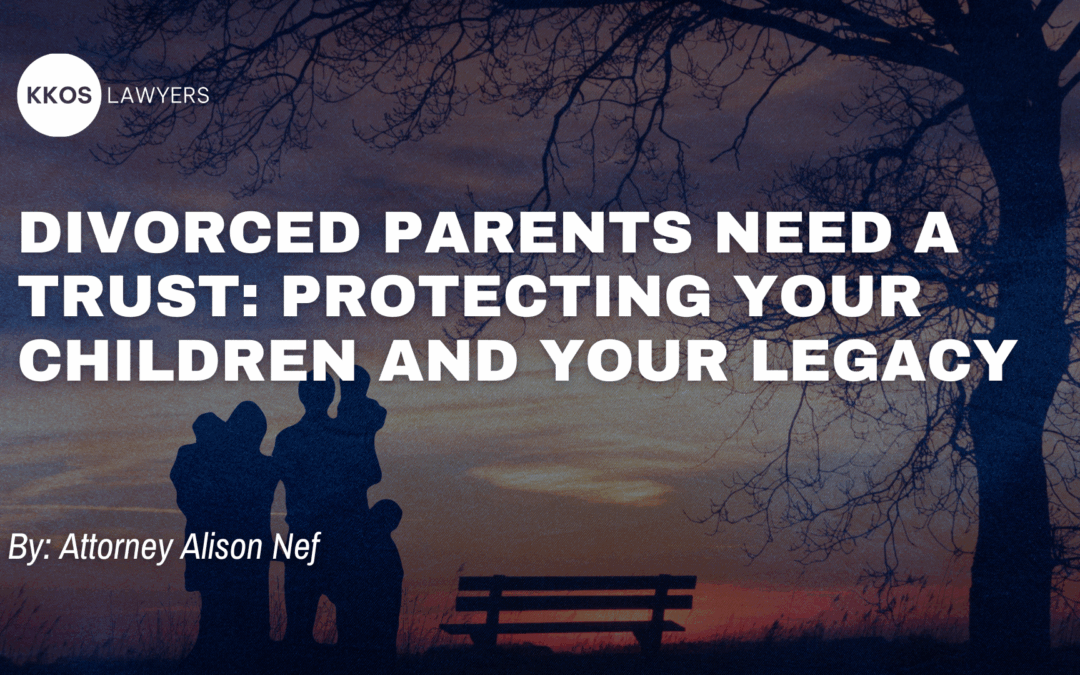Ready to Start a Comprehensive Estate Plan? Book a free 15-minute call with one of our client advisors and start preparing with confidence.
Divorced Parents Need a Trust: Protecting Your Children and Your Legacy
Divorce is often more than just a separation of lives—it can involve a breakdown of trust, shared goals, and financial alignment. So, if you pass away, why leave your legacy and assets in the hands of your ex?
The Risks of Dying Without a Trust
When a divorced parent of minor children dies without a will or trust, the court must step in to appoint someone as the guardian of the children’s estate. In most cases, the court defaults to appointing the other parent—your ex—as the guardian. This means your assets, intended for your children’s future, may end up under your ex-spouse’s control.
Even more concerning, if your child passes away before reaching the age of majority, their inheritance could automatically pass under state law to their surviving parent—again, likely your ex.
Without proactive planning, your hard-earned assets are at risk of being divided or controlled bypeople you may not fully trust, or worse, by the state.
Get personalized help from our team at KKOS Lawyers!
How a Trust Protects Your Children and Assets
Even if your ex is a responsible parent, they may not share your financial values. Creating a Trust allows you to appoint someone- a trustee- to manage your assets in the event of your death. You get to choose someone who aligns with your approach to saving, investing, and spending—so your kids’ inheritance is managed the way you would have managed it.
The trust also allows you to decide when and how your children receive their inheritance. Funds can be distributed to them for education, housing, starting a business, travel, or other enriching experiences essentially giving them opportunities you would have provided if you were alive. The Trust allows you to set those parameters and ensure that your children do not miss out on opportunities you would have provided particularly if their other parent does not share your enthusiasm, understanding, or ability to finance those opportunities.
Additionally, If you have a particularly difficult ex-spouse or if they are in difficult financial situations due to bankruptcy, lawsuits, or remarriage complications, assets you placed in your trust which are being managed by a Trustee for your children’s benefit in your absence are insulated from that chaos.
Planning for a Blended Family
If you remarry, state laws determine how your estate is divided upon your death—typically giving your new spouse a portion (often one-third or one-half) and your biological children the rest. Stepchildren are generally excluded entirely under intestacy laws. Does this one-size fits all approach work for your family?
Divorced parents often relocate for work, family, or remarriage, and each state has its own probate and inheritance laws. By creating a trust, you are not bound by these varying rules—you set the terms, ensuring your children’s inheritance is managed consistently no matter what state they end up living in.
Blended family dynamics are complex, and state laws are a blunt and fluctuating tool—they cannot account for nuanced family situations. By creating a trust, you retain control: you can provide for your new spouse, your biological children, and even stepchildren in the way that reflects your genuine intentions.
Protecting your Children’s Assets in Their Divorce
Since you have already been through a divorce, you know first-hand how financially draining it can be. One gifts you can give your children is protecting them from experiencing that same kind of loss with their inheritance.
When you leave assets outright to your children upon your death, those assets are considered part of their personal property. This means that if they later go through a divorce, their inheritance could become entangled in divorce proceedings—potentially leaving a portion of it vulnerable to claims by their ex-spouse.
A trust changes that outcome. By placing your children’s inheritance into a trust, you create a legal structure that keeps the inheritance separate from marital property. The trust acts as a protective shield for your child’s inheritance.
Take Control of Your Estate
Rather than leaving your children’s inheritance and your legacy to the ex, courts, or state laws, upon your death, put yourself in the driver’s seat. A revocable living trust allows you to make thoughtful, loving, and precise decisions for your children’s financial future, your new spouse, and stepchildren or blended family members.
At KKOS Lawyers, we can craft a comprehensive estate plan for you which will include a revocable living trust, a will, power of attorney for healthcare, power of attorney for financial, and other important ancillary documents. We will discuss and work around the sensitive and blended family issues to ensure your assets end up in the hands you want, when you want.
Book a Call or Learn More About Our Comprehensive Estate Plan
